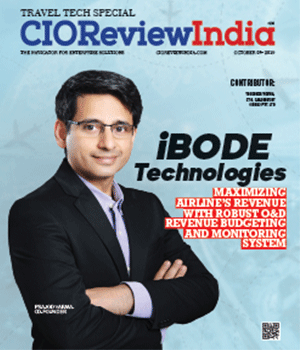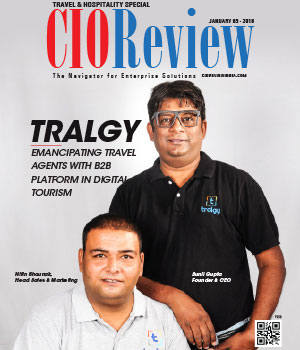
Hospitality Technology: Trends To Watch Out For In 2019
Manoj Sharma, CTO At Cleartrip.Com | Friday, 16 August 2019, 11:33 IST
 The role of technology helps in reducing human efforts and also augmenting it. This has been beautifully captured as a recurring theme in science fiction stories. Since the past few years, it has a perpetual presence in every industrial discourse as well. The results are in front of us to see: technology has helped reality to catch up with the fantastical settings of sci-fi lore.
The role of technology helps in reducing human efforts and also augmenting it. This has been beautifully captured as a recurring theme in science fiction stories. Since the past few years, it has a perpetual presence in every industrial discourse as well. The results are in front of us to see: technology has helped reality to catch up with the fantastical settings of sci-fi lore.
Like every other sector, the hospitality landscape is leveraging advanced technologies to provide highly-personalized services to customers. Hotels are enhancing their patrons’ experience by aligning their data-driven services with their guests’ preferences and sensibilities. The following are some of the ways hotels are accomplishing this:
1. Voiced-based customer support services
AI-enabled smart devices such as Amazon Echo, Google Home, Apple Home Kit, etc. have already made their way into the lives and homes of modern,tech-savvy individuals. This smart integration is also being leveraged by leading players in the travel and hospitality domain to enhance service delivery and user experience.
Users need no longer type their search queries; they can simply ‘ask’ their virtual assistants what they need to know and what they want done. Checking flight ticket availability? Ask away. Booking it? Your virtual assistant is at your service.
Various mainstream players across sectors have set up tech-driven customer support to enhance and enrich their patrons’ experience. Air travel emerges as a prominent industry where the combination of cutting-edge technologies such as AI and NLP is being leveraged to facilitate voice-based support services to consumers. Automated systems are also being used to notify passengers about any possible delay or discrepancy in their travel schedules and deliver effective corrective suggestions accordingly.
Taking a leaf out of its book, the hospitality industry, too, can translate this tech-enabled facility into their operational infrastructure to offer more streamlined and convenient customer support services. AI-run voice-based service, for example, will enable users to browse through hotels, book rooms, or conduct any query in a hassle-free manner. Further, since these systems deliver immediate and precise results, they inevitably help in mitigating customer bounce rates on online platforms.
"In a bid to deliver excellent services to customers, the continuous digital adoption by hospitality players will lead these present trends to accelerate and evolve for the foreseeable future"
2. Oscillating between self- and automated services
A fascinating trend is fast emerging in the hospitality sector. Guests can now have a faster and presence-less experience of carrying out some of the simple tasks at hotels – remotely checking-in and checking-out, for example. Further, many hotels are offering app-based room service options to users, thus reducing the burden of human interaction wherever possible.
In a singularly remarkable instance, China is geared to launch its first automated hotel. This development underlines how technology can be used by hospitality players to enhance end-user service delivery and ensure more seamless guest experiences.
3. Room key on a guest’s mobile device
The hotel room key is undergoing an intriguing evolution. From its latest state as electronic cards, it is soon to become a stream of data on guests’ mobile devices. Now, guests need no longer worry about losing their keys or forgetting their e-cards inside the room. All they need to do is scan visual codes using their smartphone to enter their rooms. Some hotels are also experimenting with the NFC (Near-field communication) technology to offer their new-age patrons with a tech-savvy experience.
4. Location-based services
Many hotels in Europe are already leveraging SIPDECT technology to enhance the customer experience. SIP-DECT provides the ultimate connectivity tools to a hotel’s employees, keeping them reachable regardless of their location in the hospitality premises. It further offers the staff seamless and limitless mobility over the property while ensuring assured contact with any and all departments at all times. The inter-departmental interaction allows the members of hotel staff to work in seamless coordination to provide superior services to guests.
5. Fixed-Mobile Convergence
This transcendental technology enables guests to connect their mobile devices to the fixed room phones in their rooms to enjoy seamless connectivity with the hotel’s digital services. A guest can pair their smartphone or any other mobile device with their room phone to be able to remotely control connected electronic end-points. This can include TV, AC, the sound system, the blinds, the doors, and lighting system, and so on.
With the emergence of ground-breaking technologies, businesses across all sectors are integrating the latest advancements into their organizational processes to stay ahead of the digital curve. In a bid to deliver excellent services to customers, the continuous digital adoption by hospitality players will lead these present trends to accelerate and evolve for the foreseeable future.
CIO Viewpoint
Service Management In The Age Of Digitization
By Douglas Duncan, CIO, Columbia Insurance Group
Which Technology Best Suits The Hospitality...
By Jessie Burgess, Executive Vice President, CIO, G6 Hospitality LLC
Technology Trends Reshaping The Hospitality...
By Ankur Bhatia, Cto At Hostmaker
CXO Insights
COVID Crisis for Hotels: How to Plan Forward
By Siddharth Goenka, MD Octave Hotels & Founder, Aiosell Technologies
Data And Automation In The Hotel Industry
By Jason Michael Fawaz, Vice President of Revenue at Hawkeye Hotels
Key Trends Shaping Travel Tech In 2019




.jpg)
.jpg)
.jpg)



